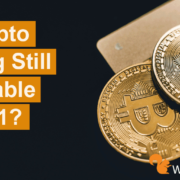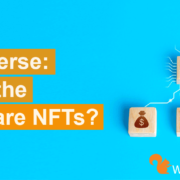SoFi’s Crypto Guide for Beginners

What is Cryptocurrency?
Cryptocurrency, often abbreviated to “crypto,” is any type of decentralized, digital currency that’s based on cryptography. IIf you want to understand cryptocurrencies for beginners, these three principles—decentralized, digital, and cryptography—are key.
Decentralized means that the currency isn’t issued by a central authority like a government or bank. The currency is instead possessed, exchanged, and governed by those who use it.
And it’s digital, meaning that crypto isn’t based on dollars or coins or gold. Instead, the currency is generated by a mathematical process done by a network of computers. This same network is then used to process and exchange the currency all around the world.
Cryptography refers to the mathematical and technical tools used to ensure that each unit of cryptocurrency is unique and can’t be copied. Cryptocurrency was designed to solve a problem in computer science: How to verify that a digital object is unique, and has not and can not be copied without using a central respiratory or databases. The technology used in cryptocurrencies, known as a distributed ledger, is based on cryptographic techniques. Cryptography is the field of communicating in codes that can be translated by two parties who are communicating with each other but are indiscernible from a third party. This matters for cryptocurrency because holders of it need a way of saying that the cryptocurrency they possess is uniquely theirs.
The “ledger” that records all Bitcoin and Bitcoin transactions is known as the “blockchain.” It was invented alongside Bitcoin as a decentralized way to transact with digital money. On the most basic level, it is the technology that enables Bitcoin to move about the Internet.
While different cryptocurrencies are based on different mathematical processes and have different user bases and networks which support them, they are all based on this principle. This guide to cryptocurrency is intended to be a resource for those just learning about crypto.

What are the Different Types of Crypto?
Bitcoin
Bitcoin was created in 2009, making it the first and most widely-known cryptocurrency. It is a scarce asset issued under a predictable schedule, with the rate halving every four years until it stops at 21 million units. Bitcoin is held in digital wallets, which allow its owners to hold, access, and spend them. An increasing number of retailers are accepting bitcoin for their goods and services, but bitcoin transactions also happen on trading exchanges.
What is Bitcoin & How Does it Work? >
Bitcoin Cash
Bitcoin Cash was created in 2017 after some developers became frustrated with the slowdown of Bitcoin transactions (and subsequent higher fees) as Bitcoin’s 1-megabyte data blocks filled up. So they executed a hard fork on the Bitcoin blockchain and came up with Bitcoin Cash, which has a much larger block size of 8MB. For users, that means faster processing speeds and lower fees.
Difference Between Bitcoin & Bitcoin Cash? >
Ethereum
Ethereum is a computing platform that enables decentralized applications to be built. Its programming language is considered to be more flexible than earlier cryptocurrencies and allows transactions to occur in seconds. As opposed to relying on a central company to play gatekeeper and run applications, ethereum utilizes a system of “nodes”—computers and servers that are independently operated.
Litecoin
Litecoin is based on blockchain technology like Bitcoin, with its main distinction being a faster time to confirm transactions. While Bitcoin’s average confirmation time is around 10 minutes, Litecoin is roughly 2.5 minutes. Litecoin is sometimes considered the “silver” to Bitcoin’s “gold.”
What is Litecoin & How Does it Work? >
How to Invest in Cryptocurrency
To invest in Bitcoin or other cryptos you need to find a way to purchase it and hold it. You typically need to use a specialized cryptocurrency broker or exchange which can convert “fiat” (i.e. dollars or any other standard currency) into crypto and then also securely store your crypto in what’s known as a “wallet.”
But the “why” of crypto investing is just as important as the how.
One reason to think about investing in crypto is diversification. The theory of diversification holds that an investor can reduce the risk of their portfolio by investing in a variety of different assets, or a variety of securities within a certain asset class, or by increasing the number of assets or number of securities they’re investing in.
The oldest crypto, Bitcoin, is just over ten years old, meaning there isn’t much historical data to refer to compared to, say, the S&P 500. But crypto might still make sense to investors as an investment in a new technology or an asset that’s drawing intense interest both as a new way of conducting transactions online and as an investment product.

Cryptocurrency Investing Rules and Regulations
While cryptocurrency has become much easier to buy and sell thanks to widespread interest in it from the general public, the cryptocurrency rules and regulations are less well established than they are for other types of assets or currencies like stocks or dollars.
The Securities and Exchange Commission (SEC), which regulates the trading of many financial assets, has basically split the cryptocurrency world into two. Bitcoin is a “payment mechanism and store of value,” i.e. not a “security,” which is the type of financial asset used to raise money for a company, like a stock or bond, and come under much more strict scrutiny from the SEC. Many “tokens,” cryptocurrencies issued by companies to fund or pre-fund a business project, do fall under the SEC’s definition of “security” and thus face much harsher and strict regulation.
But even if the SEC is not as interested in mainstream crypto, the Internal Revenue Service is. The IRS has detailed guidance on the tax implications of buying and selling Bitcoin and other cryptocurrencies that should be reviewed before investing in them.
Is Buying Crypto Safe?
One of the biggest concerns with cryptocurrency investing is safety and security. While designed on the principles of cryptography, cryptocurrency—especially in its early days—was beset by hacks and can be more tricky to manage than, say, a bank account.
To store crypto securely, an investor needs to use a crypto wallet, a software program for managing the assets. But even if you have software you trust, you will be relied on to store and remember and secure a password that only you know. This is frequently an issue with crypto, as people who forget their passwords essentially have had their assets stranded.
To get crypto into the wallet itself, investors need to use a crypto exchange. How crypto exchanges work is that they provide a platform for buying and selling crypto—either by exchanging one type of crypto for another, or, more typically, using fiat money to purchase or receiving fiat money for crypto you sell. Even as crypto exchanges grow in popularity and more sophisticated security systems are designed, hacks and instances of theft still continue to take place.
SoFi secures all crypto holdings from fraud or theft—so your holdings are protected.+
This article originally appeared on Sofi and republished with their approval.
+SoFi takes security seriously across all of the brand’s products. SoFi Invest uses a number of tools to secure crypto holdings against theft, including two-factor authentication, SSL encryption, partnering with trusted exchanges like Coinbase to complete transactions, and not sharing personal information about our members with crypto trading partners and custodians. Before you purchase crypto through SoFi Invest, it is important to understand the volatility of its value, and therefore its inherent risk. There is a minimum of $10 to buy or sell crypto. SoFi will apply a markup of up to 1.25% for each crypto transaction. For more information, visit SoFi.com/crypto.
This is not an offer, or solicitation of any offer to buy or sell any security, investment, or other product.
SoFi Invest® The information provided is not meant to provide investment or financial advice. Investment decisions should be based on an individual’s specific financial needs, goals and risk profile. SoFi can’t guarantee future financial performance. Advisory services offered through SoFi Wealth, LLC. SoFi Securities, LLC, member FINRA / SIPC . The umbrella term “SoFi Invest” refers to the three investment and trading platforms operated by Social Finance, Inc. and its affiliates (described below). Individual customer accounts may be subject to the terms applicable to one or more of the platforms below.
1) Automated Investing—The Automated Investing platform is owned by SoFi Wealth LLC, an SEC Registered Investment Advisor (“Sofi Wealth“). Brokerage services are provided to SoFi Wealth LLC by SoFi Securities LLC, an affiliated SEC registered broker dealer and member FINRA/SIPC, (“Sofi Securities).
2) Active Investing—The Active Investing platform is owned by SoFi Securities LLC. Clearing and custody of all securities are provided by APEX Clearing Corporation.
3) Digital Assets—The Digital Assets platform is owned by SoFi Digital Assets, LLC, a FinCEN registered Money Service Business.
For additional disclosures related to the SoFi Invest platforms described above, including state licensure of Sofi Digital Assets, LLC, http://www.sofi.com/legal. Crypto: Bitcoin and other cryptocurrencies aren’t endorsed or guaranteed by any government, are volatile, and involve a high degree of risk. Consumer protection and securities laws don’t regulate cryptocurrencies to the same degree as traditional brokerage and investment products. Research and knowledge are essential prerequisites before engaging with any cryptocurrency. US regulators, including FINRA , the SEC , the CFPB. PDF File , have issued public advisories concerning digital asset risk. Cryptocurrency purchases should not be made with funds drawn from financial products including student loans, personal loans, mortgage refinancing, savings, retirement funds or traditional investments. External Websites: The information and analysis provided through hyperlinks to third party websites, while believed to be accurate, cannot be guaranteed by SoFi. Links are provided for informational purposes and should not be viewed as an endorsement.Investment Risk: Diversification can help reduce some investment risk. It cannot guarantee profit, or fully protect in a down market.
Terms and Conditions Apply. SOFI RESERVES THE RIGHT TO MODIFY OR DISCONTINUE PRODUCTS AND BENEFITS AT ANY TIME WITHOUT NOTICE. To qualify, a borrower must be a U.S. citizen or other eligible status and meet SoFi’s underwriting requirements. Not all borrowers receive the lowest rate. To qualify for the lowest rate, you must have a responsible financial history and meet other conditions. If approved, your actual rate will be within the range of rates listed above and will depend on a variety of factors, including term of loan, evaluation of your creditworthiness, years of professional experience, income, and a variety of other factors. Rates and Terms are subject to change at anytime without notice and are subject to state restrictions. SoFi refinance loans are private loans and do not have the same repayment options that the federal loan program offers, or may become available, such as Income Based Repayment or Income Contingent Repayment or PAYE. Licensed by the Department of Financial Protection and Innovation under the California Financing Law License No. 6054612. SoFi loans are originated by SoFi Lending Corp., NMLS # 1121636. (www.nmlsconsumeraccess.orgOpens A New Window.)
✝︎ To check the rates and terms you qualify for, SoFi conducts a soft credit pull that will not affect your credit score. However, if you choose a product and continue your application, we will request your full credit report from one or more consumer reporting agencies, which is considered a hard credit pull and may affect your credit.
©2021 Social Finance, Inc. All rights reserved.










Wallet –
Wild how fast SoFi is becoming a jack of all trades – refinance loans, higher yield account, investing and Crypto. Wild!
-Lanny
I’m still surprised Crypto is going as strong has it has been. I still own zero crypto, and I have a hard time justifying it without dividends, lol.
-Andrew